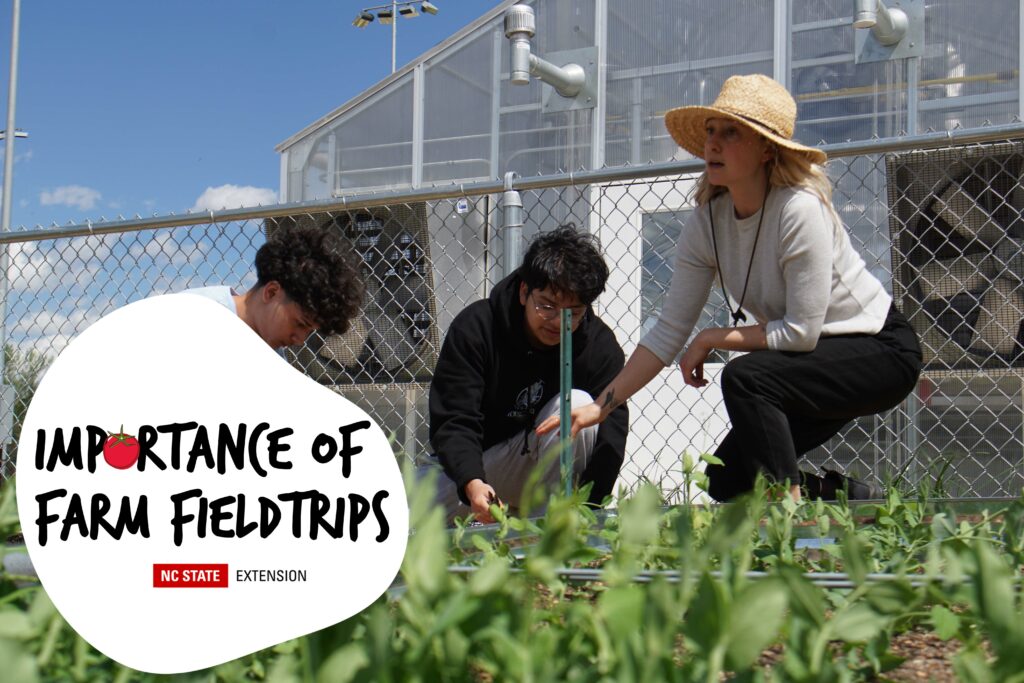The Importance of Farm Field Trips
go.ncsu.edu/readext?1038661
en Español / em Português
El inglés es el idioma de control de esta página. En la medida en que haya algún conflicto entre la traducción al inglés y la traducción, el inglés prevalece.
Al hacer clic en el enlace de traducción se activa un servicio de traducción gratuito para convertir la página al español. Al igual que con cualquier traducción por Internet, la conversión no es sensible al contexto y puede que no traduzca el texto en su significado original. NC State Extension no garantiza la exactitud del texto traducido. Por favor, tenga en cuenta que algunas aplicaciones y/o servicios pueden no funcionar como se espera cuando se traducen.
Português
Inglês é o idioma de controle desta página. Na medida que haja algum conflito entre o texto original em Inglês e a tradução, o Inglês prevalece.
Ao clicar no link de tradução, um serviço gratuito de tradução será ativado para converter a página para o Português. Como em qualquer tradução pela internet, a conversão não é sensivel ao contexto e pode não ocorrer a tradução para o significado orginal. O serviço de Extensão da Carolina do Norte (NC State Extension) não garante a exatidão do texto traduzido. Por favor, observe que algumas funções ou serviços podem não funcionar como esperado após a tradução.
English
English is the controlling language of this page. To the extent there is any conflict between the English text and the translation, English controls.
Clicking on the translation link activates a free translation service to convert the page to Spanish. As with any Internet translation, the conversion is not context-sensitive and may not translate the text to its original meaning. NC State Extension does not guarantee the accuracy of the translated text. Please note that some applications and/or services may not function as expected when translated.
Collapse ▲
Farm field trips are a fantastic way to promote hands-on learning with students and local growers. Students venture out of the classroom, interact with nature, and have first-hand encounters with seasonal crops while meeting local farmers and producers in their community.
Northern High School, in Durham, NC, has built strong connections with the Hub Farm and Bull City Farm. These partnerships support agriculture, culinary education, and community engagement while enhancing the curriculum. In the curriculum, students have a comprehensive farm-to-table experience, teaching them the effort of maintaining a garden and working in a kitchen. During their animal science unit, students visit Bull City Farm, where they participate in guided tours to see cattle, chickens, and other farm animals. While learning about vegetable production, Hub Farm offers harvesting and planting projects that align with the curriculum.YouTube video featuring the farm field trips with Northern High School teachers, students, and local farmers.
Culinary students visit and volunteer at Hub Farm every month. This symbiotic relationship helps students understand where their food comes from and introduces them to crops they have never seen before. When culinary students see fresh produce in grocery stores, they can think, “I know several ways to prepare or even grow that.”
At Northern High School, the goal is to combine vocational training on the farm with agriculture education and culinary training in the kitchen. This approach wonderfully demonstrates the importance of farm field trips: encouraging learning, play, and creativity while nurturing students’ curiosity.
For more North Carolina farm to school stories, please visit our YouTube page at youtube.com/@NCSUFarmtoSchool.


